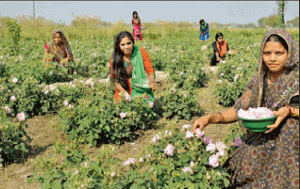Aligarh :
At Khitoli village, Hasayn, Hathras district, mid-March is when the process for extracting rose essence (ruh) begins. The process will go on till the end of April, over a period of 40 days. There is a big rose mandi here. Ask farmers what the secret of the rich aroma of the roses of this region is, and the answer is unanimous – human poop.
The rose of this region is called “Noorjehan” – jewel of the world — after the wife of Mughal emperor Jahangir. The air in the village at this time year is laden with the aroma of roses.
Workers are seen plucking roses early in the morning, while dewdrops are still on the buds. They measure the roses, add bunches of them into water to steam in a large copper container called degh to extract ruh. About 250 kg of flowers yield just 40 gm of ruh.
Work on the floriculture crop begins in October each year, with the sowing of seeds.
“The good yield of the rose is because of fertile land – and if you are thinking what makes the soil here especially fertile, it is human poop,” says Mahesh Pal Singh, former pradhan of the village whose father Veer Pal Singh started the work of rose essence extraction some 65 years ago in Khatoli. Veer Pal Singh died at the age of 108 last week.
“The farmer is also a scientist,” Singh says. “He knows what is good, what is not. Most of us avoid cow dung and prefer human poop in our fields as manure. Almost 95% of our villagers don’t have toilets at home. All the men, women and children answer the call of nature in the fields. That is why the produce in the village is far better than what is grown in farms away from human habitation.”
One cannot then help wonder if toilets in village homes is at all a good idea then, in this part of Hathras district.
“The toilets are only part of the big houses here. Just about five village homes here have toilets – the rest go to the field. That is what is best, not just for the rose crop, but also for potatoes. We need bijli (electricity) and sadak (roads) rather more urgently that toilets. It would save us the bother of going out of the way to transport our produce,” farmer Bahadur Singh says.
“And what when every house has a toilet?”
“There will be no roses then,” the farmer says, with quiet conviction.
The essence extracted from the rose is later used in tobacco, perfume and soap manufacturing.
Horticulture officer Kaushal Kumar of Aligarh says, “Yes, there is truth to the belief that human excrement is good manure – there is a good quantity of micro-nutrients in excrement, as well as nitrogen, potassium and potash. But for the sake of hygiene, it should first be treated well.”
It is human poop that also breeds earthworms, farmers say. “They make the land fertile, dig the ground and make soil breathe,” Bahadur Singh says.
Kaushal, however, said it was not as if there was a direct link between foul-smelling human excrement and sweet-smelling roses: “The excrement makes the land fertile and aids in growth. Without it, some nutrients would be lost to the soil. Even the farmers are aware that the transition is no direct one, he says.
Besides poop and earthworms, the rose crop also needs moisture-laden easterly winds at the beginning of the growing season – rain in that time could damage the crop, farmers say.
source: http://www.timesofindia.indiatimes.com / The Times of India / Home> City> Agra / by Eram Agha, TNN / March 29th, 2015









